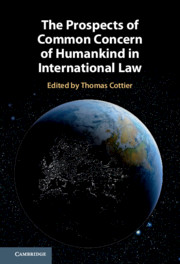Book contents
10 - Comments
Extraterritoriality and Common Concern
from Part III - Epilogue
Published online by Cambridge University Press: 04 May 2021
Summary
Discussants Professor Cedric Ryngaert, Dr Claus Zimmermann, and Professor Krista Nadakavukaren Schefer were asked to address at the workshop held on 22–23 June 2018 at the World Trade Institute, Bern, Switzerland, the implications of the notion, concept, and potentially emerging principle of Common Concern of Humankind on territoriality and extraterritorial effects and the critical issue of compliance and unilateral enforcement. Their authorized interventions are transcribed below. The comments place the doctrine in the context of current research on extraterritorial effects and efforts to balance interests at stake and define the scope of unilateral measures in international law. They discuss the implications of Common Concern of Humankind on sovereignty of states and how the doctrine supports the idea of cooperative or shared sovereignty. They discuss jurisdiction in the context of multilevel governance and the ‘five-storey house’ and show that extraterritorial effects are necessarily inherent. Finally, they address the duty to act and support the idea that this amounts to the most important aspect of an emerging principle of Common Concern of Humankind. The comments are encouraging and by and large support the findings of the chapters in this volume.
- Type
- Chapter
- Information
- Publisher: Cambridge University PressPrint publication year: 2021



